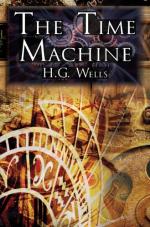’About eight or nine in the morning I came to the same seat of yellow metal from which I had viewed the world upon the evening of my arrival. I thought of my hasty conclusions upon that evening and could not refrain from laughing bitterly at my confidence. Here was the same beautiful scene, the same abundant foliage, the same splendid palaces and magnificent ruins, the same silver river running between its fertile banks. The gay robes of the beautiful people moved hither and thither among the trees. Some were bathing in exactly the place where I had saved Weena, and that suddenly gave me a keen stab of pain. And like blots upon the landscape rose the cupolas above the ways to the Under-world. I understood now what all the beauty of the Over-world people covered. Very pleasant was their day, as pleasant as the day of the cattle in the field. Like the cattle, they knew of no enemies and provided against no needs. And their end was the same.
’I grieved to think how brief the dream of the human intellect had been. It had committed suicide. It had set itself steadfastly towards comfort and ease, a balanced society with security and permanency as its watchword, it had attained its hopes—to come to this at last. Once, life and property must have reached almost absolute safety. The rich had been assured of his wealth and comfort, the toiler assured of his life and work. No doubt in that perfect world there had been no unemployed problem, no social question left unsolved. And a great quiet had followed.
’It is a law of nature we overlook, that intellectual versatility is the compensation for change, danger, and trouble. An animal perfectly in harmony with its environment is a perfect mechanism. Nature never appeals to intelligence until habit and instinct are useless. There is no intelligence where there is no change and no need of change. Only those animals partake of intelligence that have to meet a huge variety of needs and dangers.
’So, as I see it, the Upper-world man had drifted towards his feeble prettiness, and the Under-world to mere mechanical industry. But that perfect state had lacked one thing even for mechanical perfection—absolute permanency. Apparently as time went on, the feeding of the Under-world, however it was effected, had become disjointed. Mother Necessity, who had been staved off for a few thousand years, came back again, and she began below. The Under-world being in contact with machinery, which, however perfect, still needs some little thought outside habit, had probably retained perforce rather more initiative, if less of every other human character, than the Upper. And when other meat failed them, they turned to what old habit had hitherto forbidden. So I say I saw it in my last view of the world of Eight Hundred and Two Thousand Seven Hundred and One. It may be as wrong an explanation as mortal wit could invent. It is how the thing shaped itself to me, and as that I give it to you.




